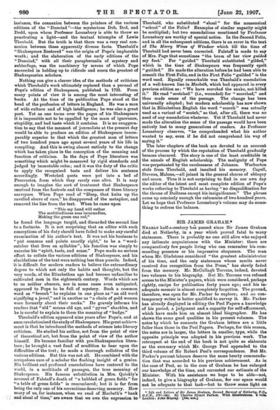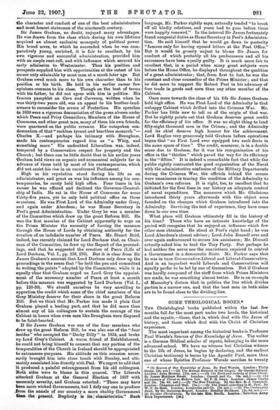SIR JAMES GRAHAM.*
NEARLY half-a-century ha's passed since Sir James Graham died at Netherby, in a year which proved fatal to many statesmen. There is probably no one still alive who enjoyed any intimate acquaintance with the Minister: there are comparatively few people living who can remember his com- manding presence or his impressive eloquence. The man whom Mr. Gladstone considered "the greatest administrator of his time, and the only statesman whose merits never received due recognition from the Press," has slowly faded from the memory. Mr. MoCullagh Torrens, indeed, devoted two volumes to his biography. Bat Mr. Torrens was refused access to the Minister's papers, which were considered, perhaps rightly, unripe for publication forty years ago; and his in- adequate memoir is almost completely forgotten. The ground, therefore, was open for Mr. Parker to explore; and no con- temporary writer is better qualified to survey it. Mr. Parker has already displayed in editing the Peel Papers a knowledge of his period, a judgment and a capacity for self-effacement, which have made him an almost ideal biographer. He has shown the same good qualities in his present volumes. The notes by which he connects the Graham letters are a little fuller than those in the Peel Papers. Perhaps, for this reason, the notes are in larger, the letters in smaller, type, while the opposite principle was adopted in his previous work. The retrospect at the end of the book is not quite so elaborate as the summary which Mr. George Peel appended to the third volume of Sir Robert Peel's correspondence. But Mr. Parker's present labours deserve the same hearty commenda- tion that was accorded to his previous achievement. As in the case of Peel, so in the case of Graham he has enlarged our knowledge of the time, and corrected our estimate of the Minister. With his assistance we hope to be able—not, indeed, to give a biography of Graham, for our space would not be adequate to that task—but to throw some light on
• Life and Lettere of Sir Jaws Graham, Second Baronet of Netherby. P.C.,
(LC.B., 179?-1861. By Charles Stuart Parker. With III Sioux. 2 vols. London John Wormy. (29s. net.]
the character and conduct of one of the best administrators and most honest statesmen of the nineteenth century.
Sir James Graham, no doubt, enjoyed many advantages. He was drawn from the class which during his own lifetime acquired an almost exclusive monopoly of political power. His broad acres, to which he succeeded when he was com- paratively young, enriched, it is fair to recollect, by his own vigorous and successful administration, provided him with an ample rent-roll, and with influence which secured his early admission to Westminster. Thus his position and prospects supplied him with opportunities at the outset of his career only attainable by most men at a much later age. But Graham owed much more to his own character than to his position or his birth. He held in his earlier career few "opinions common to his class. Though on the best of terms with his father, he did not agree with him in politics. His famous pamphlet on Corn and Currency, written when he was thirty-two years old, was an appeal to his brother-land- owners to reconsider the errors of Protection. His speeches in 1830 were a vigorous denunciation of the gross abuses under which Peers and Privy Councillors, Members of the House of Commons, and other great men, many of them his own friends, were quartered on the public revenue. His outspoken con- demnation of that "reckless tyrant and heartless monarch"— Charles X.—and perhaps his intimacy with Brougham, made his contemporaries regard him as "a Whig, and something more." His undoubted Liberalism was, indeed, tempered by a Conservative respect for property and the Church; but there can be little doubt that in his earlier years Graham held views on organic and economical subjects far in advance of those held by most of his contemporaries, which did not assist his rise in an unreformed Parliament.
High as his reputation stood during his life as an administrator, and great as was his influence among his con- temporaries, he rarely held high office. Four times in his career he was offered and declined the Governor-General- ship of India. He sat in the House of Commons for some nil-V.1re years, yet he only held political office on three occasions. He was First Lord of the Admiralty under Grey, and again under Aberdeen; he was Home Secretary in Peel's great Administration. Under Grey he was a member of the Committee which drew up the great Reform Bill. He was the first member of the Cabinet apparently to urge on the Prime Minister the necessity of forcing the measure through the House of Lords by obtaining authority for the creation of an indefinite number of Peers. Mr. Stuart Reid, indeed, has recently claimed for Lord Durham that, as Chair- man of the Committee, he drew up the Report of the proceed- ings, and that he suggested the creation of Peers (Life of Lord Durham, Vol. I., pp. 238, 270). But it is clear from Sir James Graham's account that Lord Durham only drew up the proceedings in the sense that "he held the pen and committed to writing the points" adopted by the Committee; while it is equally clear that Graham urged on Lord Grey the appoint- ment of the necessary number of Peers at least a month before this measure was suggested by Lord Durham (Vol. L, pp. 120-30). We should ourselves be very unwilling to apportion the credit which some of the chief members of the Grey Ministry deserve for their share in the great Reform Bill. But we thiuk that Mr. Parker has made it plain that Graham played a leading part, and that he did more than almost any of his colleagues to sustain the courage of the Cabinet in hours when even men like Brougham were disposed to be faint-hearted.
If Sir James Graham was one of the four members who drew np the great Reform Bill, he was also one of the "four insides" who occupied the "Derby Dilly" in 1834, and broke up Lord Grey's Cabinet. A warm friend of Establishment, he could not bring himself to consent that any portion of the temporalities of the Church in Ireland should be appropriated to extraneous purposes. His attitude on this occasion neces- sarily brought him into close touch with Stanley, and ulti- mately associated him directly with PeeL We regret to add that it produced a painful estrangement from his old colleagues. Both sides were to blame in this quarrel. The Liberals attacked Graham at the General Election of 1837 with unseemly severity, and Graham retorted : "There may have been more wicked Governments, but I defy any one to produce from the annals of our country a more shabby Government than the present. Duplicity is its.' characteristic." Such
language, Mr. Parker rightly says, naturally tended "to break off all kindly relations, and years had to pass before these were happily renewed." In the interval Sir James fortunately found congenial duties as Home Secretary in Peel's Administra- tion. He said himself that he would go down to posterity "famous only for having opened letters at the Post Office." But it would be grossly unjust to blame Sir James for conduct of which probably all his predecessors and all his successors have been °pally guilty. It is much more fair to recollect that, in a period when many great subjects were before the Home Office, he displayed throughout the qualities of a great administrator; that, from first to last, he was the constant and close counsellor of the Prime Minister ; and that he did more to support Sir Robert Peel in his advocacy of free trade in goods and corn than any other member of the Cabinet.
Once more towards the close of his life Sir James Graham held high office. He was First Lord of the Admiralty in that unhappy Cabinet which drifted into the Crimean War. Mr. Parker has little new to tell us of the origin of that war. But he rightly points out that Graham deserves great credit for the efficiency of his office. It was no slight thing to land fifty-eight thousand men in the Crimea ; and the Admiralty and its chief deserve high honour for the achievement. Lord Raglan very generously told Graham before operations began that "no First Lord ever equipped two such fleets in the same space of time." The credit, moreover, is in a double sense due to Graham, for it was his reorganisation of his office in the " thirties " which paved the way for its efficiency in the " fifties." It is indeed a remarkable fact that while the public rightly contrasted the good organisation of the Naval with the administrative confusion of the Military Departments during the Crimean War, the officials behind the scenes were unanimous in tracing the condition of the Admiralty to Graham's own reforms. It is right, too, to recollect that ho initiated for the first time in our history an adequate control of naval expenditure. The measures which Mr. Gladstone introduced thirty years afterwards with this object were founded on the changes which Graham introduced into the Admiralty. Surviving the test of experience, they have come down to our own time.
What place will Graham ultimately fill in the history of his time? Those who have an intimate knowledge of the period will recognise that he enjoyed an influence which few other men obtained. He stood at Peel's right hand ; he was Lord Aberdeen's closest adviser ; Lord John Russell over and over again endeavoured to secure his assistance; Mr. Disraeli actually asked him to lead the Tory Party. But perhaps he had neither the nerve nor the convictions required to control a Government in a democratic State. Mr. Parker says that he was in turn Conservative-Liberal and Liberal-Conservative. And in an imperfect world Liberals and Conservatives will equally prefer to be led by one of themselves. But if Graham was hardly composed of the stuff from which Prime Ministers are made, he was something almost better. He is an example of Macaulay's dictum that in politics the line which divides parties is a narrow one, and that the beet men on both sides are to be found close to the dividing-line.











































 Previous page
Previous page